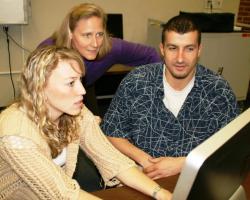‘Virtual’ internships prepare student teachers for new world of online schooling
Posted April 15, 2010
UF student-teacher John Giddo's seventh graders don't need to raise their hands to answer a question or pose their own. They can post it on the class’s online discussion board instead.
Giddo, in his final year of UF’s five-year teacher preparation program, is one of a new breed of “virtual” teaching interns, spending part of his last spring semester in an apprenticeship with the Orlando-based Florida Virtual School (FLVS), the nation’s largest K-12 virtual school.
All aspects of teaching—and learning—are done online. Giddo’s supervising teacher from FLVS and her middle-school virtual students all work from their home computers, while Giddo can work either from his own laptop or from a UF College of Education computer lab.
Discussion forums are one of Giddo's favorite things about virtual learning.
"If we have discussions in the normal classroom, some students usually have more to say than others," he says. "Online classes gives students who are more shy a chance to say what they want in the comfort of their own home. They can contribute what they’re too scared to contribute in class."
 During his four-week internship, Giddo (pictured in UF's computer lab with student Kristen Brooks, left, with instructor Kara Dawson looking on) created a virtual tutorial on earthquakes, graded assignments, and improved his communication skills as he learned to give explicit, easy-to-understand instructions online. He hopes to use such technology in his own classroom once he graduates into the teaching profession in May. He hopes he can blend online learning with traditional face-to-face instruction in a “hybrid” classroom.
During his four-week internship, Giddo (pictured in UF's computer lab with student Kristen Brooks, left, with instructor Kara Dawson looking on) created a virtual tutorial on earthquakes, graded assignments, and improved his communication skills as he learned to give explicit, easy-to-understand instructions online. He hopes to use such technology in his own classroom once he graduates into the teaching profession in May. He hopes he can blend online learning with traditional face-to-face instruction in a “hybrid” classroom.
“I’m always thinking about how I could apply online learning in my classroom,” he says. “Students who get sick to their stomach over things like animal dissections could, instead of getting a zero, still participate in an online form of dissections,” says Giddo.
UF officials said the university’s College of Education is one of five in the nation to offer a virtual school internship program, with all 19 students in the education technology concentration area participating. Voluntary apprenticeships also were available for graduate students.
The internships prepare students for the increased role that online learning is playing in contemporary education. More than a million K-12 students in 45 states were enrolled in online courses during the 2007-08 school year, says Kathryn Kennedy, a UF doctoral student in curriculum and instruction. By 2011, more than 8 million K-12 students are expected to use some form of online learning. Kennedy is writing her dissertation about the experiences of three UF virtual school interns.
“This online teaching experience adds a valuable bonus point on the interns’ resumes that not many recent education graduates can claim,” says Kennedy. “It makes them aware there’s another employment option for them.”
The month-long, virtual internship program came about two years ago through a partnership between UF and the Florida Virtual School. Cathy Cavanaugh, associate professor of education technology, coordinates the internship with FLVS, and associate professor Kara Dawson teaches the educational media practicum course with the internship component.
Interns start by observing their supervising teachers placing phone calls with their students, writing emails and launching class web conferences. Later, interns act more as teaching assistants and participate in classroom discussions, grade assignments and create tutorials. It was an eye-opening experience for some interns.
“We talk to people all the time who had no idea children are taking online courses, let alone that it’s been around for 10 years,” says UF associate professor Cathy Cavanaugh, who teaches educational technology courses and studies best practices in distance education and virtual schooling. “Virtual schools involve less than 5 percent of students and teachers in the K-12 grades, so it’s kind of invisible at that level. You can’t just walk down the street and see a virtual school.”
Cavanaugh said virtual schools are particularly advantageous in rural school districts for students who wish to take Advanced Placement, International Baccalaureate, foreign language, or art classes that are often unavailable in smaller communities. Students struggling to keep up in a traditional classroom can work at their own pace online. The state only compensates Florida Virtual School when a student completes the course, so the school is oriented to ensure student success.
The virtual school provides teachers with the lesson plans, saving them more time to spend with students. Most virtual school teachers and students say that they have more interaction in their online classes than they do in traditional face-to-face classes, says Cavanaugh.
Kristen Brooks, 23, a UF master’s student in education from Boca Raton, Fla., interned through FLVS with a health and physical education class. Brooks concluded she’d rather teach students face-to-face than online, but she was impressed by her supervising teacher’s ability to get to know her students from a distance.
“My teacher told me if a student calls her, she recognizes their voice and knows who it is,” she says.
Cavanaugh said that in today’s depressed economy, online schools are hiring and expanding at a faster rate than traditional schools.
”Anyone who has the online teaching experience that our virtual interns receive is definitely at an advantage when they enter the job market,” Cavanaugh said.
# # #
CONTACTS
Source: Cathy Cavanaugh, Associate Professor, Educational Technology, (352) 273-4176; cathycavanaugh@coe.ufl.edu
Writer: Jennifer Tormo, Intern, UFCOE News & Communications
Media Contact: Larry Lansford, UFCOE News & Communications, (352) 273-4137; llansford@coe.ufl.edu




